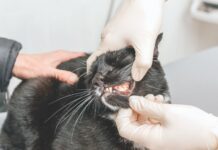Q. Dear Elizabeth: Last summer, my husband and I became the proud keepers of Miss Looci, a four-week-old rescue cat. She’s a lovely, strictly indoor cat — long-haired and pure black. Since she’s been with us, Looci has become my home-bound husband’s constant companion, and she’s become quite big and strong. We love her, and she gets plenty of attention. But here’s our problem: Looci has the habit of suddenly biting me, my husband or our guests while she’s being petted. Why does she do this, and how can we stop her?
A. You can consider yourself fortunate on two counts. First, you’ve had the pleasure of opening your heart to a cat you love. Second, you’re lucky that Looci’s annoying biting habit has not caused you, your husband or your guests any serious injury. Those sharp little fangs of hers can pose a significant health threat if they break the skin, since an open wound can allow bacteria to travel deeply into a bite-victim’s system. Over time, this can create a deep-seated infection marked by redness, swelling, pain and fever. As the infection progresses, the bite victim can experience fever, fatigue and headaches, and the implications can be severe — especially if the cat is harboring a dangerous bacterial species, such as streptococcus, staphylococcus or pasteurella.
Let’s consider several possible reasons for Looci’s undesirable behavior. The first thing to rule out is an underlying medical issue. Such a problem seems unlikely, given Looci’s young age and indoor-only status, but we must still consider the possibility that she has an area of pain or extreme sensitivity that, if touched, is causing her to react by biting. Cats react in a variety of ways to pain, and Looci’s first instinct may be to bite. A physical examination and X-ray imaging may be necessary to rule out any skeletal or muscular problems.
I should also mention a condition called feline hyperesthesia syndrome, which is chiefly characterized by a cat’s abnormal sensitivity of the skin. Cats with this condition are typically resistant to petting, especially along the spine down to the base of the tail. And since Looci seems to enjoy being petted — at least for a while — I doubt that this is her problem. But again, a veterinary examination is in order.
To my mind, Looci’s biting is most likely the consequence of her having been adopted by you when she was only four weeks old. Generally speaking, shelters do not put a kitten up for adoption before it is eight to 12 weeks of age. This allows the kitten to spend a lot of time with its mother and its litter mates, during which period it learns appropriate social interactions and skills, among which is what veterinarians refer to as “bite inhibition.” A kitten comes to understand that biting is hurtful, as its mother scolds it and possibly removes it from the company of its playmates. This is an important period of learning and socialization, and if a kitten is taken away from its mother and siblings when it is only four weeks old, it will not have had enough time to learn proper manners.
I suspect that this is the cause of Looci’s biting habit. She missed out on an important phase of socialization during which her mother would have taught her what behavior is appropriate and what isn’t. Keep in mind that this type of biting — called play aggression — has nothing to do with ill will or a desire to inflict injury. Looci simply hasn’t learned that this way of playfully relating to her siblings can really hurt and perhaps cause injury. So now, without knowing any better, she’s persisting in this play aggression, with you, your husband and your guests now substituting for her feline playmates. It’s her weird way of bonding with you.
There are several warning signs that Looci has had enough petting and is about to bite. She is likely to squirm a bit in your lap; her ears may flatten against her head; her tail may swish; and she may stare directly into your face. If she displays such signs and seems about to bite, shout sharply at her and gently move her off of your lap. Also, you may want to invest in one of those infrared laser pointers that emit a beam of light to distract her and take her mind away from biting you. If you’re lucky, this biting behavior may simply resolve as she matures. If it persists, you may want to consult with a veterinary behaviorist. It’s possible that Looci might need to be treated with a pacifying medication.
Meanwhile, I suggest that no one other than you and your husband hold and pet Looci. Until her potentially dangerous biting behavior has ceased, advise your guests to admire her from a distance and to avoid close contact with her. Good luck! Love, Elizabeth



